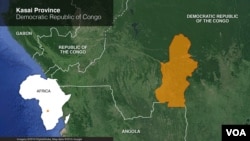An official from the United Nations' World Food Program has issued a warning about the situation in the southwest of the Democratic Republic of Congo, where conflict has left 3.2 million people severely hungry.
In the past year, about 1.4 million residents of Congo’s Kasai region have been displaced by violence that has killed more than 3,000 people and destroyed entire villages, according to Claude Jibidar, who heads the WFP in Congo.
Jibidar says the situation is comparable to well-known crisis zones like Syria and Yemen. Congo, the massive central African nation, now has the highest burden of displaced people in Africa.
“The number of people displaced during that time period is more than Syria, than Yemen, than all the other emergencies that you know of,” he said. “That just tells you about how serious the situation is in the DRC.”
The WFP is not the only humanitarian group calling attention to the Kasai region. Medical aid group Doctors Without Borders recently warned of widespread malnutrition among children, with rates of severe acute malnutrition as high as 10 percent in some areas.
Horrific tales
The violence began last year after the killing of a tribal leader who defied longtime President Joseph Kabila, whose term officially ended in December 2016. Critics have accused Kabila of being slow to hold fresh elections, in what they say is a bid to cling to power.
The Kasai violence quickly spiraled into ethnic clashes, massacres and abuses at the hands of armed groups, including Congo’s army. Jibidar, who visited the area last week, says many residents who had fled into the bush to escape violence emerged with horrific tales to tell.
“It is the use of machete; it is the systematical use of rape on women; it is really terrible, terrible things,” he said. “Kasai has been characterized by the beheading of a lot of people. You have heard about the mass graves; it has been a terrible situation. People who are coming out, they are just traumatized. Traumatized.”
Without significant increases in funding from donor nations, he says, the agency will run out of food by mid-November.
He says the bigger solution to Kasai’s woes is beyond the scope of his U.N. agency. Jibidar noted the DRC government has made progress in restoring peace, along with the U.N. peacekeeping force in Congo.
“It is a question of sustained, long-term security and peace,” he said. “That is the first thing. Without peace and security maintained, now it is calm, it has to remain calm. People have to regain confidence and they all have to come out of the bush.”





